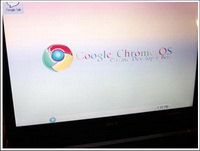Google Demonstrates Its Chrome OS
Yesterday Google presented an early version of its Chrome operating system. the company announced that it would be released to the open source community.

Chrome is Google’s development project that covers a browser and an operating system.
The OS will be very similar to the browser, largely because it will only run web apps. So it will be mostly browser, plus a few necessary bits like file system, when it does show up on devices next year, IT PRO reports.
It was also reported, Google claimed that the reliance on web-based tools means that memory errors and crashes will be isolated in a 'sandbox' and unable to allow larger exploits. Additionally, the OS will be able to diagnose and repair itself in the event of an attack, the firm said.
"Unlike traditional operating systems, Chrome OS doesn't trust the applications you run," wrote engineering director Matt Papakipos and group product manager Caesar Sengupta in a blog post. "Furthermore, Chrome OS barely trusts itself."
Additionally, Google is looking to tailor Chrome OS for speed. The company plans to cut load times by stripping down start-up processes and creating a reference for hardware recommendations to achieve faster performance, V3.co.uk reports.
Telegraph.co.uk quoted Sundar Pichai, Google’s vice president of product management, as saying, “Over the past few years, people have been spending more and more of their time online doing more and more powerful things, and we wanted to build a fundamentally different computing experience built for the way we use the web today. With Google Chrome OS, we’ve made computing faster, easier and safer than ever before.”
But some experts say Google could find it difficult to persuade consumers. Users will not be able to install their own software or applications on Chrome OS devices – so that means no iTunes, no Skype and no Tweetdeck.
“There’s no doubt that Chrome OS looks fast, but it’s fairly limited in terms of its functionality,” says Annette Jump, an analyst with Gartner. “A lot of work needs to be done to convince consumers that this operating system will be useful to them.”
And that’s not the only stumbling block Chrome OS faces – its reliance on always-on web connectivity might be possible in large cities, with good mobile phone network coverage and plenty of Wi-Fi hotspots, but in rural areas, or on a flight, Chrome will be hobbled, Telegraph.co.uk reports.
Subscribe to Pravda.Ru Telegram channel, Facebook, RSS!





